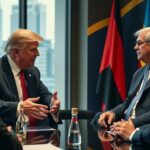Impacts of Trump’s Tariffs on South Africa, Nigeria, Kenya, and Ghana
President Trump has introduced significant tariffs, starting with a 10% baseline for all imports to the US, with additional rates for various African nations, including 30% for South Africa. Other countries such as Nigeria and Kenya also face tariffs, resulting in potential economic consequences and strains in US-African relations.
In a recent announcement, President Donald Trump has implemented a minimum 10% tariff on all imports to the United States, alongside additional reciprocal tariffs specifically targeting several African nations. Notably, South Africa faces a 30% tariff, while other countries such as Lesotho, Madagascar, Mauritius, and Botswana are subjected to even steeper rates, ranging from 37% to 50%. Furthermore, Nigeria’s exports are hit with a 14% tariff, while Kenya, Ghana, and other East African nations face the baseline 10% tariff.
Trump remarked that these tariffs are intended for countries that he asserts “treat us badly” and expressed his grievances that the United States has been exploited by “cheaters” in global trade. This policy marks a significant shift in trade relations as he accused foreign nations of “pillaging” American economic interests. The President declared this initiative as a move towards “economic independence” for the United States.
South Africa finds itself among the nations labeled the “worst offenders” by Trump, which include major economies like China and Japan. He noted that South Africa imposes a significant tariff of 60% on US imports, although this figure encompasses various charges. In response, the South African government has condemned Trump’s tariffs as “punitive,” warning that they could inhibit trade and economic growth.
Additional context reveals that Madagascar faces the heaviest burden with a staggering 93% tariff on US imports, coupled with Nigeria’s 27% tariff on US goods. The tariffs also coincide with the implementation of a 25% tax on all foreign-made automobiles, which is anticipated to impact vehicle imports from countries heavily relied upon by African nations.
These new trade measures, set to commence from April 5 for the baseline tariffs and April 9 for specific countries, occur at a time when many African economies are still reeling from recent cuts to US foreign aid that provided critical support for health and humanitarian needs. The ongoing decline in US-South Africa relations worsens amid criticism from Trump regarding South Africa’s land reform policies, which he claims discriminate against white farmers. Economists suggest that this apparent shift indicates a departure from prior open trade agreements that have characterized US-Africa relationships.
In conclusion, the recent tariffs imposed by President Trump represent a strategic pivot in the United States’ trade policy toward Africa, adversely impacting several significant economies such as South Africa, Nigeria, and Kenya. These tariffs are seen as punitive measures following accusations of unfair trade practices, which threaten existing economic relationships and exacerbate the challenges posed by cuts in foreign aid. The potential implications of these tariffs could reverberate throughout the continent as nations adjust to the new trade landscape.
Original Source: www.bbc.com






Post Comment